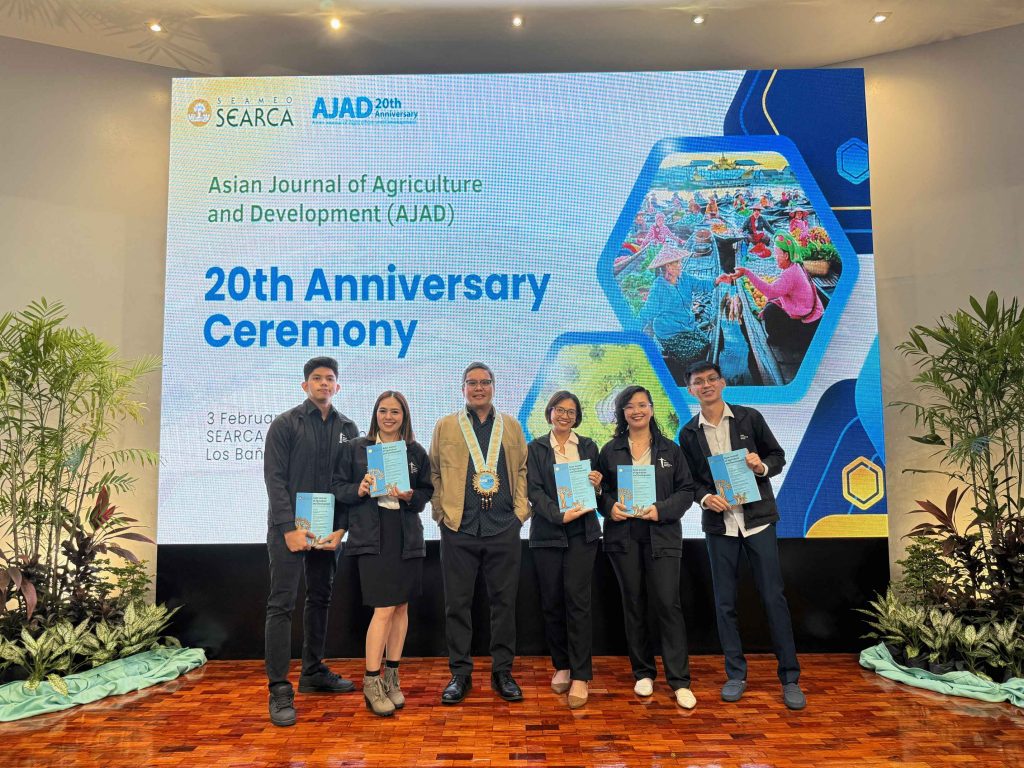The University of the Philippines Resilience Institute (UP RI) proudly joined the Asian Journal of Agriculture and Development (AJAD) in celebrating its 20th anniversary with a grand ceremony at the SEARCA Umali Auditorium. This milestone event brought together esteemed scholars, policymakers, industry leaders, and institutions dedicated to advancing research and sustainable development in agriculture and related fields.
The event was graced by NEDA Secretary Arsenio M. Balisacan, who delivered a keynote address reflecting on AJAD’s evolution and impact. As a former SEARCA Director and the Founding Editor of AJAD, Secretary Balisacan expressed his support for AJAD’s expanded scope, particularly in welcoming policy-oriented studies that integrate social science perspectives with technical scientific research in agriculture. His speech underscored the importance of interdisciplinary collaboration in addressing agricultural challenges.
The AJAD 20th Anniversary Issue was formally launched by AJAD Editor and former NEDA Secretary Dr. Cielito F. Habito, emphasizing the journal’s commitment to providing valuable insights for agricultural and economic development. During the launch, each article featured in the special issue was recognized on stage, including those authored by UP RI and NOAH – WebGIS developers, highlighting their significant contributions to the field.

Dr. C. Peter Timmer, Professor Emeritus of Development Studies at Harvard University, also presented his paper, “How I Learned to Stabilize Rice Prices and Why,” offering a retrospective on his extensive research and experience in food security and market stability. His presentation sparked discussions on practical solutions for ensuring food security amidst market volatility.
Adding to the discourse, SEARCA Executive Director Dr. Glenn B. Gregorio, SEARCA Senior Fellow and former Bangko Sentral ng Pilipinas Monetary Board Member Dr. V. Bruce Tolentino, and SEARCA Deputy Director for Programs Dr. Nur Azura Binti Adam shared their perspectives on the significance of agricultural resilience and policy innovations. Their discussions underscored the role of research and policy integration in advancing sustainable agricultural practices.
Former SEARCA Directors Dr. Gil Saguiguit, Jr., Dr. Ruben Villareal, and Dr. Fernando Bernardo also attended the event, highlighting SEARCA’s longstanding commitment to research and development in agriculture and rural economies.
A key highlight of the event was the presentation by Dr. Mahar Lagmay, Executive Director of UP RI, who shared insights on UP RI’s pioneering research and development on Impact-Based Flood Forecasting for Citizen Empowerment. Initially launched as a project with the German Red Cross, this study focused on enhancing agriculture resilience in the Panay River Basin. Recognizing its potential for broader disaster risk reduction, the initiative expanded into a nationwide framework integrating rainfall forecasting, flood hazard mapping, and barangay-level flood assessment, equipping communities with critical flood warnings up to a day in advance. This innovative system has significant implications for agricultural communities across the Philippines. By predicting flood impacts before they occur, farmers and agribusinesses can make informed decisions on safeguarding crops, livestock, and infrastructure, potentially reducing economic losses and improving food security.
As climate change continues to pose challenges to agricultural sustainability, interdisciplinary collaborations like these play a crucial role in fostering resilience. UP RI remains committed to leveraging science and technology for disaster preparedness, ensuring that farmers and agricultural stakeholders are equipped with the tools they need to mitigate risks and thrive in an ever-changing environment.
